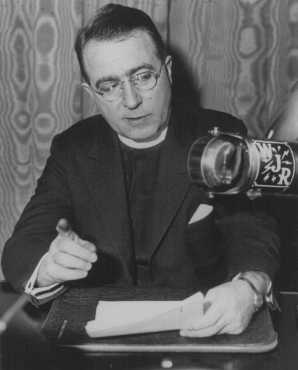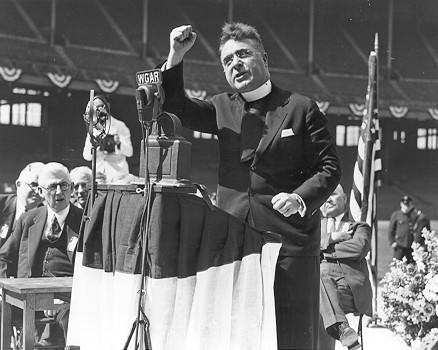Father Coughlin first broadcast was in 1926, broadcasting weekly sermons over the radio. By the early 1930s the content of his broadcasts had shifted from religion to economics and politics. Most of the nation was focused on matters of economics and politics being that the country was in the aftermath of the Great Depression, so was Father Coughlin. At first, he was a supporter of President Franklin Delano Roosevelt. Father Coughlin had a very well-developed theory that he phrased “social justice," predicated on monetary reforms. Father Coughlin considered President Roosevelt a reformer like himself. Roosevelt's approach during his inaugural address totally promised to "drive the money changers from the temple." Coughlin's was in total agreement since a big part of his own message was monetary reform. Roosevelt's early monetary policy seemed to fulfill this promise and so Coughlin viewed him as the savior of the nation. Later in the 1930s his focus shifted against President Roosevelt and he then became one of his ruthless critics. His program of "social justice" was a very radical challenge to capitalism and too many of the political institutions of his day. When President Roosevelt failed to follow-on with additional radical reforms, Coughlin turned against him. By 1936, he would support a third-party candidacy called the Union Party. This party did not last very long. It was against President Roosevelt. He had some harsh words for the President he said:
"The great betrayer and liar, Franklin D. Roosevelt, who promised to drive the money changers from the temple, had succeeded [only] in driving the farmers from their homesteads and the citizens from their homes in the cities. . . I ask you to purge the man who claims to be a Democrat, from the Democratic Party, and I mean Franklin Double-Crossing Roosevelt."
Father Coughlin's influence on America Depression-era America was massive. Millions of Americans listened to his weekly radio broadcast. At the height of his popularity, one-third of the nation was tuned into his weekly broadcasts. In the early 1930s, Coughlin was, questionably one of the most influential men in America. Although his core message was one of economic populism, his sermons also included attacks on well-known Jewish figures. These attacks that many people considered evidence of anti-Semitism. His broadcasts became increasingly controversial. In 1940 much to his dismay his superiors in the Catholic Church forced him to stop his broadcasts and return to his work as a parish priest.






